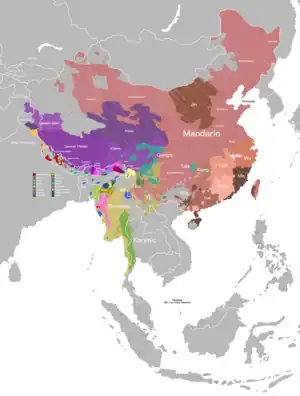| Sangkong | |
|---|---|
| Buxia | |
| Native to | China |
| Ethnicity | Hani |
Native speakers | (1,500 cited 1995)[1] |
| Language codes | |
| ISO 639-3 | sgk |
| Glottolog | sang1320 |
| ELP | Sangkong |
 Sangkong is classified as Vulnerable by the UNESCO Atlas of the World's Languages in Danger | |
Sangkong (Chinese: 桑孔; autonym: saŋ55 qʰoŋ55) is a Loloish language spoken in China by the Hani people in Xiaojie Township 小街乡, Jinghong County. They are called Buxia (布夏) by the local Dai people (Li 2003).
Li (2003) covers the Sangkong dialect of Manwanwa village 曼宛洼寨, Menglong Town 勐龙镇, Jinghong County.[2] It may be the same as the Muda language. You Weiqiong (2013:172) reports that Buxia 布夏 (Sangkong 桑孔) is spoken in 7 villages of Menglong 勐龙.[3]
Sangkong verb phrases take one of two person markers: ŋa for 1st person, and ʑe for non-1st person.[4]
References
- ↑ Sangkong at Ethnologue (18th ed., 2015) (subscription required)
- ↑ "景洪市勐龙镇曼宛洼村委会曼宛洼村". Archived from the original on 2014-10-30. Retrieved 2014-10-11.
- ↑ You Weiqiong [尤伟琼]. 2013. Classifying ethnic groups of Yunnan [云南民族识别研究]. Beijing: Ethnic Publishing House [民族出版社].
- ↑ Matisoff 1993.
- Li, Yongsui. 2003. A study of Sangkong. Beijing: The Nationalities Press.
- Matisoff, James A. (1993). "Sangkong 桑孔 of Yunnan: Secondary "verb pronominalization" in Southern Loloish" (PDF). Linguistics of the Tibeto-Burman Area. 16:2: 123–142 – via Google Scholar.
This article is issued from Wikipedia. The text is licensed under Creative Commons - Attribution - Sharealike. Additional terms may apply for the media files.
